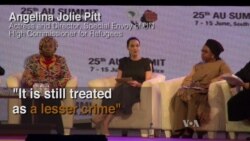African leaders in Johannesburg for this year’s African Union summit have a unique opportunity to set priorities, policies and reach consensus on important issues like raging conflicts, political problems and more.
But critics say this relatively small group of powerbrokers is deciding what the entire continent needs without seeking the input of regular people.
While leaders have a lot to discuss this week, Burundi has dominated discussion as its president's efforts to stay in power, which already prompted one coup attempt, continue to spark violent protests. South Sudan, still mired in conflict that has killed thousands of people and displaced more than 2 million, has also been on the agenda.
Watch related video report of Angelina Jolie
But most of the summit action — which really only starts when heads of state converge — happens behind closed doors.
U.N. Economic Commission for Africa chief Carlos Lopes warned delegates of the peril of being out of touch with the harsh realities of the continent.
“Consultations do not by themselves lead to high-quality plan documents or, even less, implementation," said Lopes.
Analysts predict that South Africa’s open culture may foster something that is a fixture of other international summits — but never the AU summit.
“Perhaps at this summit, for the first time, we’ll see some civil society protests, some action," said Africa analyst Liesl Louw-Vaudran.
But inside the summit, there is little room for other voices. Outside groups say they have been consistently denied a seat at the table.
Henry Malumo of ActionAid International says advocacy groups like his are disappointed because the AU promised them more of a stake in the discussions.
“It’s remained all talk, and very little or no action," he said.
"From the Malabo [Equatorial Guinea] conference that took place last year, where civil society was completely banned from entering, to the current [summit] in Johannesburg...civil society has been [limited to] a ceremonial representation," said Malumo.
Jeggan Grey-Johnson of the Open Society Foundation asked the AU for greater access to the summit. He said civil society groups have a lot to contribute.
“In the true spirit of partnership, and also civil society demonstrating that they are committed to one Africa, a prosperous Africa, a citizen-driven African Union, we are actually putting these concerns on the table in good faith, to say that 'we are here, we are your partners, and we shouldn’t be shut out,'" said Grey-Johnson.
Development, conflict, women's empowerment and the economy are some of the issues that come up at every African Union summit and affect the more than 1.1 billion people on the continent.
And it all comes down to the private discussions of these several dozen powerful men and women.






